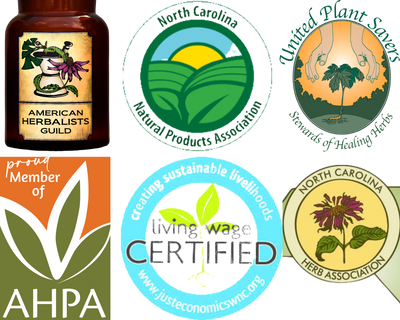Herbs to Avoid During Pregnancy
As a women-owned, women's health-focused company for almost 30 years, we hold the reproductive realm and the health of women and all pregnant people with utmost reverence. We support all people in making the empowered, informed decisions about what they put in their bodies, especially herbally. And when it comes to herbs, we know there are powerful plants that you do not want to mess around with if you desire a healthy pregnancy.
Herbs that Support Your Desired Pregnancy Outcome
Yes, herbs are as simple as the everyday cinnamon in your cinnamon-apple oatmeal, or as basic as the lavender in your daily body wash. And yet - herbs are often more powerful than we give them credit for, and can help us to achieve a variety of outcomes in the world of fertility and pregnancy.
No matter whether it's a healthy pregnancy and birth that you desire, or a different outcome, know that there are herbal allies out there for you. The most important thing in any scenario is that you are making safe choices and able to tune in and deeply listen to your body and what it needs as an individual. The plants are here for it all!
Your Body, Your Herbs
During pregnancy, you might feel that the whole world (well, really the important things like sushi, soft cheeses, and soaking in the hot tub) develops a big danger sign over it, and it's all directed towards you. And when it comes to herbs, things are no different. A wealth of herbs that you might have felt were perfectly safe pre-pregnancy suddenly holds a menacing threat. You might even wonder about the basil in your pesto pasta or the mint garnishing your fruit salad.
The reality is that due to lack of funding and ethical gray area issues, many herbs do not have an evidence-based track record of safety in pregnancy and thus get labeled as unsafe, though their uses may be supported by anecdotal evidence. Fortunately, there are some herbs that have a strong historical and traditional use in pregnancy that supersedes the lack of information on them (some of which we talk about here). And there are those that we categorically want to avoid when a healthy birth is the desired outcome.
Categories of Herbs to Avoid During Pregnancy
In general, those in their first trimester of pregnancy are better off using few herbs, and only those that have an established safety record, because of the delicacy of this stage of fetal development. Herbal use in the second and third trimesters, while it should still stick to herbs known to be safe, can be a bit more generous.
While there are a variety of different herbs to be aware of that contraindicate with pregnancy, we can simplify these by focusing on specific categories to avoid. Uterine stimulants, herbs with high amounts of volatile oils, emmenagogues, and progesterone-decreasing herbs are a few of these.
Uterine stimulants is a primary category of herb that may cause cramping, bleeding, and stimulation in the uterus. You want to stay away from any herbs that draw forth energy and blood from the uterus or pelvic region in general, such as black cohosh (Actaea racemosa) - pictured below, blue cohosh (Caulophyllum thalictroides) - pictured above, motherwort (Leonurus cardiaca), wild yam (Dioscorea villosa), aloe (Aloe vera), feverfew (Tanacetum parthenium), angelica (Angelica archangelica), mugwort (Artemisia vulgaris), tansy (Tanacetum vulgare), pennyroyal (Mentha pulegium) and goldenseal (Hydrastis canadensis). Some of these herbs are used around the time of birth to stimulate uterine contractions and bring on labor.

Juniper (Juniperus spp.), cedar (Thuja occidentalis), mugwort, and tansy all contain the constituent thujone, a powerful volatile oil that should be avoided if looking to achieve a healthy birth.
Even very large amounts of ginger (Zingiber officinalis) - pictured below - (1 tbsp-2 oz fresh ginger root in 1 cup water, 3x/day), which is an herb commonly used in small amounts throughout pregnancy and especially in the first trimester to support a happy belly, ought to be avoided during pregnancy, as it is a circulatory tonic and may be overly stimulating. Small amounts of ginger, however, have been confirmed to be very supportive of a calm tummy during any trimester.

Powerful emmenagogues that bring on and encourage blood flow should be avoided. These include yarrow (Achillea millefolium), wormwood (Artemisia absinthium), ginger, and parsley (Petroselinum crispum). Yes, parsley, that herbaceous green, when taken as a strong tea, or used as a vaginal suppository, also known as a pessary. Now, that's not to say that munching on the garnish of your dinner could be contraindicated with your pregnancy; however, parsley used in specific amounts and with consistency has been shown in case studies to contraindicate with keeping a healthy pregnancy.

It's key to avoid herbs that decrease progesterone levels, as this hormone is so key in supporting the developing fetus in a healthy pregnancy and enabling it to continue. Herbs like black cohosh and dong quai (Angelica sinensis), pictured above, influence both estrogen and progesterone levels, and their ratios, along with other hormones, so are best avoided. Their hormonal action may raise or lower progesterone levels depending on the particular instance, so while it can't be said that these herbs reliably decrease progesterone, any hormonal action like this is not desirable during a pregnancy. Cotton root bark (Gossypium hirsutum), used by midwives to encourage labor, falls into this category, as well as wild carrot seed, pictured here.

You want to avoid wild carrot or Queen Anne's lace (Daucus carota) during pregnancy, particularly if you believe the conception was very recent, as this potent oily seed may have the ability to disrupt the body's natural processes around conception and early pregnancy. For more on this phenomenon and how wild carrot seed can be used to support your desired conception outcomes throughout the menstrual cycle, see the work of one of our favorite herbalists, Robin Rose Bennett.
While comfrey oil or salve used topically is wonderful during pregnancy and postpartum (especially on those stretch marks or sore nipples, or as a juicy contributor to a lush vaginal ecosystem), use internally during pregnancy is best avoided due to liver concerns and potential unknown toxicities. Poke (Phytolacca americana), our beloved low-dose botanical, is a similar story because of its extremely stimulating lymphatic properties. While the root used topically as a potent oil or salve comes in remarkably handy for a variety of postpartum concerns, internal use during pregnancy is inadvisable.
Unless a pregnancy is not what you're wanting, there are other herbs to avoid. Rue (Ruta graveolens) and sage (Salvia officinalis) would also fall into this umbrella of herbs that may not help you to achieve the outcome of a healthy birth. Sassafras (Sassafras albidum), containing the constituent safrole, is another. This is not a comprehensive list, but addresses some of the categories of herbs you'll want to watch for.
Herbs Safe to Take During Pregnancy
We've written a series of articles about herbs in pregnancy, immune support during pregnancy, herbs for childbirth and postpartum, and even herbs for babies and toddlers. While there are a number of herbs to avoid during pregnancy, there are so many that have a long history of safe use during all the trimesters, and are not only safe but also incredibly nutritive for a pregnant body. In this category, think nettles (Urtica dioica), oatstraw (Avena sativa), chamomile (Matricaria chamomilla), holy basil (tulsi) (Ocimum sanctum), spearmint (Mentha spicata), lemon balm (Melissa officinalis), rose hips (Rosa spp.), red raspberry leaf (Rubus idaeus), and even echinacea (Echinacea spp.). We formulated some of these together into our Vita-Min tea blend for those TTC (trying to conceive), or pregnant or new mamas.

If you haven't heard of her yet, or even if you have, Aviva Romm is THE primo resource for all things herbs + pregnancy, regardless of what outcome you envision for yourself. We hope that the info above was helpful to you and affirming that the right herbs for you are out there, no matter where you are in your journey.
References
https://static1.squarespace.com/static/559a971ee4b02838d134f030/t/63a0b77f909e216c9a3ea24b/1671477134280/A+Place+for+Herbal+Abortion+in+Clinical+Herbalism_JAHG+Fall+2022.pdf
https://avivaromm.com/herbal-medicines-in-pregnancy-safety/
Humphrey (2003), The Nursing Mother's Herbal








Comments
Sabrina said:
Is it safe to take Albizia in the 2nd trimester?